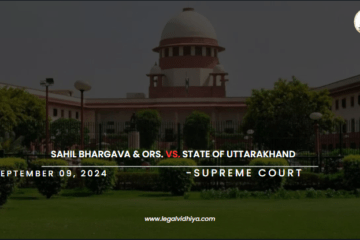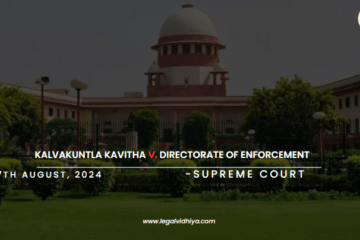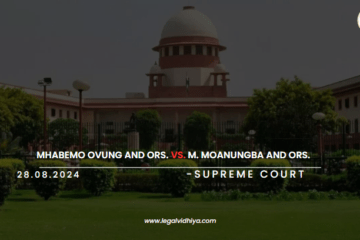
ARB. A. (COMM.) 25/2023
CITATION | Arb. A. (Comm.) 25/2023 |
| DATE OF JUDGMENT | August 14th, 2023 |
| COURT | The High Court Of Delhi |
| APPELLANT | Swatika Jain |
| RESPONDENT | Asian Hotels North Ltd |
| BENCH | Justice Sachin Datta |
- INTRODUCTION :
In the case of Swatika Jain vs. Asian Hotels North Ltd., heard in the High Court of Delhi, a judgment was delivered on August 14, 2023. The case involved Swatika Jain, who wanted to overturn a previous order and revive her appeal. She argued that her representative withdrew the appeal without proper instructions, causing harm. Swatika claimed her goods were in a shop, making her situation unique and deserving of special treatment.
On the other side, Asian Hotels North Ltd. argued that the withdrawal was agreed upon and ongoing repairs were in line with the court’s directions. The judgment, delivered by Justice Sachin Datta, dismissed Swatika’s arguments, emphasizing that concessions made during legal proceedings are binding. The court also rejected the request for special treatment compared to similar cases.
The significance of this case lies in its clarification of legal principles, particularly regarding the authority of an Arbitrator to issue interim orders even when other applications are pending. It underscores the importance of adhering to legal agreements and the challenge of altering decisions once made in a court of law. The case sheds light on the delicate balance between unique circumstances and the consistent application of legal standards.
- FACTS OF THE CASE :
1. May 29, 2020: Swatika Jain revokes the license agreement through a communication, demanding the removal of goods from the shop in Hotel Grand Hyatt by June 1, 2020.
2. Legal Disputes: Respondents dispute the revocation through legal notices, leading to ongoing disagreements over possession and repair activities.
3. Arbitration Proceedings: Arbitration proceedings are initiated, and Mr. R. L. Meena is appointed as the sole Arbitrator to adjudicate disputes.
4. May 31, 2023: Swatika Jain withdraws the appeal (ARB. A. (COMM.) 25/2023) without instructions, citing prejudice.
5. August 14, 2023: Swatika Jain files an application for restoration, seeking to set aside the withdrawal order and restore the appeal.
6. Swatika Jain filed a case against Asian Hotels North Ltd. because she wanted to challenge a decision made in her earlier appeal (ARB. A. (COMM.) 25/2023) which she withdrew. She claimed that the withdrawal happened without her instructions and was prejudicial to her.
7. Swatika argued that the Arbitrator in a related matter showed bias, and she wanted the order set aside.
8. She also pointed out that her situation with goods in the shop was different from other cases decided by the Supreme Court.
Consequently in, O.M.P. (T) (COMM.) 39/2023:
1. Petition Filed: A petition is filed under Section 14(1)(b) read with Section 15 of Arbitration and Conciliation Act, 1996, seeking termination of the mandate of the Arbitrator, Mr. R. L. Meena.
2. Mutual Agreement: Both parties mutually agree to terminate Mr. R. L. Meena’s mandate and appoint a new tribunal for dispute resolution.
3. Substituted Arbitrator Appointed: Justice Pankaj Jaiswal is appointed as the substituted sole arbitrator to adjudicate disputes between the parties.
4. Court’s Decision: The court, considering the mutual agreement, terminates the mandate of Mr. R. L. Meena and appoints Justice Pankaj Jaiswal as the new arbitrator.
- Note : These cases are interconnected through common issues related to the license agreement, disputes over possession, and the appointment of arbitrators. The withdrawal of the appeal in the Swatika Jain case and the subsequent application for restoration add complexity, while the O.M.P. (T) (COMM.) 39/2023 case provides insights into the termination of the arbitrator’s mandate and the appointment of a substituted arbitrator based on mutual agreement.
- ISSUES RAISED :
The issues raised include
- The withdrawal of the appeal without proper instructions;
- Alleged bias of the terminated arbitrator;
- Differential treatment concerning goods in the shop; and
- Failure of the respondent to conduct repair activities despite a Supreme Court order.
- CONTENTIONS OF THE PETITIONER :
The petitioner, Swatika Jain, through her authorized representative, Mr. Ajay Jain, raised several contentions in the case.
- Firstly, it was asserted that the withdrawal of the appeal on May 31, 2023, by the appellant’s counsel was done without proper instructions, causing prejudice to the applicant.
- Secondly, attention was drawn to an order dated April 15, 2023, by the concerned arbitrator regarding an application under Section 13(2) and 13(3) of the Arbitration and Conciliation Act, 1996. The petitioner argued that during the pendency of the Section 13 application, the arbitrator should not have considered/disposed of the application under Section 17 until the alleged bias controversy was resolved.
- Thirdly, the petitioner contended that the mandate of the arbitrator who passed the impugned order had been terminated, requiring the order’s setting aside. Moreover, the petitioner emphasized that her case was distinguishable from others, as many of her articles were still in the shop, unlike in the cases before the Supreme Court.
- Additionally, it was argued that no repairing activities had been undertaken by the respondent despite a Supreme Court order, and if the removal of goods was necessary, the responsibility should lie with the respondent. The petitioner sought differential treatment and restoration of the appeal, contending that the circumstances warranted a fresh consideration of the Section 17 application.
- CONTENTIONS OF THE RESPONDENT :
The respondent, Asian Hotels North Ltd., presented several contentions in response to Swatika Jain’s application seeking restoration of the appeal.
- Firstly, it was argued that the order dated May 31, 2023, was a consent order, and any attempt by the appellant to retract from it should not be permitted.
- The respondent emphasized that the proceedings against the previous arbitrator under Section 13 had no bearing on the validity of the impugned order.
- Secondly, the respondent asserted that the repair activities in the shops were in progress, aligning with the directions of the Supreme Court’s order.
- It contended that the appellant’s conduct aimed at obstructing the repair work, and there was no justification for granting the appellant differential treatment compared to similarly situated individuals.
- Lastly, the respondent objected to the appellant’s attempt to cast aspersions on the learned arbitrator who passed the impugned order, arguing that such conduct should not be countenanced.
- JUDGEMENT :
In the judgment delivered by Justice Sachin Datta on August 14, 2023, in the case of Swatika Jain v. Asian Hotels North Ltd., the court considered an application for restoration of appeal (ARB. A. (COMM.) 25/2023) and IA No. 10851/2023.
The primary issue was the withdrawal of the appeal by the appellant’s counsel on May 31, 2023, and the subsequent request for restoration.
The obiter dicta, or incidental remarks, involved the court expressing dismay at the appellant’s attempt to re-agitate issues already foreclosed by the withdrawal of the appeal. The court disapproved of the appellant’s effort to blame counsel for the withdrawal and highlighted the binding nature of concessions made before the court.
The ratio decidendi, or the legal reasoning forming the basis of the decision, centered on the lack of merit in the appellant’s contentions. The court emphasized that there was no justification for providing a separate dispensation to the appellant, as the circumstances were not different from those addressed by the Supreme Court’s order on January 13, 2023.
The court rejected the appellant’s argument regarding bias and the termination of the arbitrator’s mandate, stating that there was no legal basis to set aside the impugned order.
In simpler terms, the court held that the appellant’s attempt to reverse the withdrawal of the appeal lacked merit, and the circumstances did not warrant differential treatment. The court dismissed the application, with no order as to costs.
- CASE ANALYSIS :
The case of Swatika Jain v. Asian Hotels North Ltd. involved a plea for the restoration of an appeal before the Delhi High Court. The appellant, Swatika Jain, represented by Mr. Ajay Jain, contested the withdrawal of the appeal on May 31, 2023, alleging that it was done without proper instructions. The appellant also raised concerns about bias against the arbitrator and sought a fresh decision on the Section 17 application.
On the other hand, Asian Hotels North Ltd., the respondent, argued that the withdrawal was a consent order, emphasizing the ongoing repair activities in compliance with the Supreme Court’s directions. The respondent accused the appellant of obstructing the repair process and maintained that there was no reason for the appellant to receive differential treatment.
Justice Sachin Datta, in his judgment, aptly dismissed the appellant’s contentions. He highlighted the lack of merit in attempting to draw distinctions from cases addressed by the Supreme Court and the insufficiency of bias allegations and arbitrator’s mandate termination as grounds for setting aside the impugned order.
From a legal standpoint, the judgment reinforces the binding nature of consent orders and cautions against attempts to revisit settled matters. It underscores the court’s authority in ensuring the finality of its decisions. The dismissal of the application resonates with legal principles that discourage litigants from undermining the sanctity of court proceedings.
Viewed from a broader perspective, the case exemplifies the significance of respecting court procedures and decisions, promoting legal certainty and efficiency in the judicial process. It sends a message about the responsibility of parties to abide by consent orders and discourages tactics aimed at reopening issues already resolved by the court.
- CONCLUSION :
In conclusion, the Delhi High Court’s decision in Swatika Jain v. Asian Hotels North Ltd. underscores the importance of upholding the finality of court orders and respecting the sanctity of consent agreements.
The judgment dismisses the appellant’s attempts to revisit settled matters and highlights the binding nature of consent orders. Beyond the legal nuances, the case serves as a reminder of the responsibility of litigants to adhere to court procedures, promoting efficiency and certainty in the legal process.
Ultimately, the court’s decision reinforces the principle that once a matter is resolved through a consent order, attempts to reopen it without substantial grounds will not find favor with the judiciary.
This Article is written by Khushi Bhasin, student of Thakur Ramnarayan College of Law, Mumbai; Intern at Legal Vidhiya.
Disclaimer: The materials provided herein are intended solely for informational purposes. Accessing or using the site or the materials does not establish an attorney-client relationship. The information presented on this site is not to be construed as legal or professional advice, and it should not be relied upon for such purposes or used as a substitute for advice from a licensed attorney in your state. Additionally, the viewpoint presented by the author is of a personal nature.




0 Comments